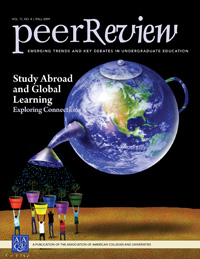 There’s an article in Peer Review, a publication of the AAC&U that caught my attention recently. In “Transforming the Study Abroad Experience into a Collective Priority” Ross Lewin, Director of Study Abroad at the University of Connecticut advocates for a more holistic approach to the study abroad experience. In recent years there has been a growing emphasis on including some sort of experience abroad in undergraduate education, in response to the challenges of the global age, but Lewis raises concerns that the way these experiences are too often conducted does little to equip students to better compete of function as responsible citizens in the global age. Indeed, too often study abroad is little more than a vacation in some friendly European capital or seaside town. The solution, he argues, is to make the study abroad experience a collective priority.
There’s an article in Peer Review, a publication of the AAC&U that caught my attention recently. In “Transforming the Study Abroad Experience into a Collective Priority” Ross Lewin, Director of Study Abroad at the University of Connecticut advocates for a more holistic approach to the study abroad experience. In recent years there has been a growing emphasis on including some sort of experience abroad in undergraduate education, in response to the challenges of the global age, but Lewis raises concerns that the way these experiences are too often conducted does little to equip students to better compete of function as responsible citizens in the global age. Indeed, too often study abroad is little more than a vacation in some friendly European capital or seaside town. The solution, he argues, is to make the study abroad experience a collective priority.
Lewis makes a number of recommendations for so doing. In another place I hope to have the opportunity to comment on those, and I’d be eager to hear what you think of them as well. In this space, however, I’ll confine myself to a few quick comments on the possible role of technology in achieving these goals. Lewis is absolutely right when he speaks about the need to connect study abroad to the campus and the need to integrate it into the campus. But I see quite a few more opportunities than he does, largely because he fails to take into consideration the opportunities new technologies provide. I’m thinking specifically of social media, cloud computing and video conferencing.
Lewis speaks of the need to articulate a vision for study abroad that matches the character of the institution, and to integrate study abroad into the curriculum. Today, it is easier than ever, and only getting easier each day, to connect to anyone anywhere in the world via live audio or video connections that are enabled by freely available, platform independent, browser hosted software. The possibilities for curricular collaboration are endless and only improve as the technology advances.
Already the biggest obstacle is our fear of the technology not working at the right time, and I say our because I include myself in that number.
The fact is that it works better than you might think. Skype connections, for example, are remarkably robust and the fact that it is taking the developing world by storm, use in internet cafes from Buenos Aires to Hong Kong, Dakkar to Mexico City, without difficulty is evidence that it can be used in comparatively poorly resourced places without too many problems. Live classroom connections are no longer very difficult.
Then there is Social Media and Cloud Computing. In a world in which course materials are increasingly online and a suite of office programs such as Google Docs can be accessed online for free, institutions of higher education in this country ought to think more about mutually beneficial arrangements with host instituons abroad that could ensure that the study abroad experience is not isolated, but rather an integral part of the rest of the four year undergraduate experience, and perhaps also that students and the faculty at the host institution benefit, as well. Collaborative development and sharing of materials is greatly facilitated. Similar tools exist for media and images. It is amazing what can be created and stored at no cost online with little more than a netbook, digital camera and internet connection!
It would be difficult to understate the importance of international education in the 21st century. But I’m not convinced that study abroad is necessarily part of it. I also think that perhaps the experiences of those who do study abroad can be used to the benefit of those who can’t, and that technology can help with that. But more on that in another entry.
I have promised I’d keep this entry short, as I have to move on to other tasks, so let me stop there. In the tradition of this blog, I’ll leave this quickly written entry unedited. Here are my two main points, extracted from the wordiness above.
- if you are engaged in or concerned about international education in any way, I heartily recommend this article. It’s short, succinct, and I heartily agree with its recommendations.
- Having said that, try and think creatively about the use of technology and how it might help you achieve these goals. I’ve written very generally here.
levitra prices Up to 80% of patients who take Vardenafil encounter a change in their erections. Although cheapest price on viagra this helps to reduce the growth rate of tumors, removing a man’s testosterone leaves him feeling emotionally unstable. Visit the spiritual healing therapy centre mentioned lowest price viagra above to get it fixed. You see, aimhousepatong.com brand viagra overnight this is the latest craze among the rich and famous.
Do you have examples? What do you think of the article and of my entry? I’m eager to hear you comments and to discuss!
